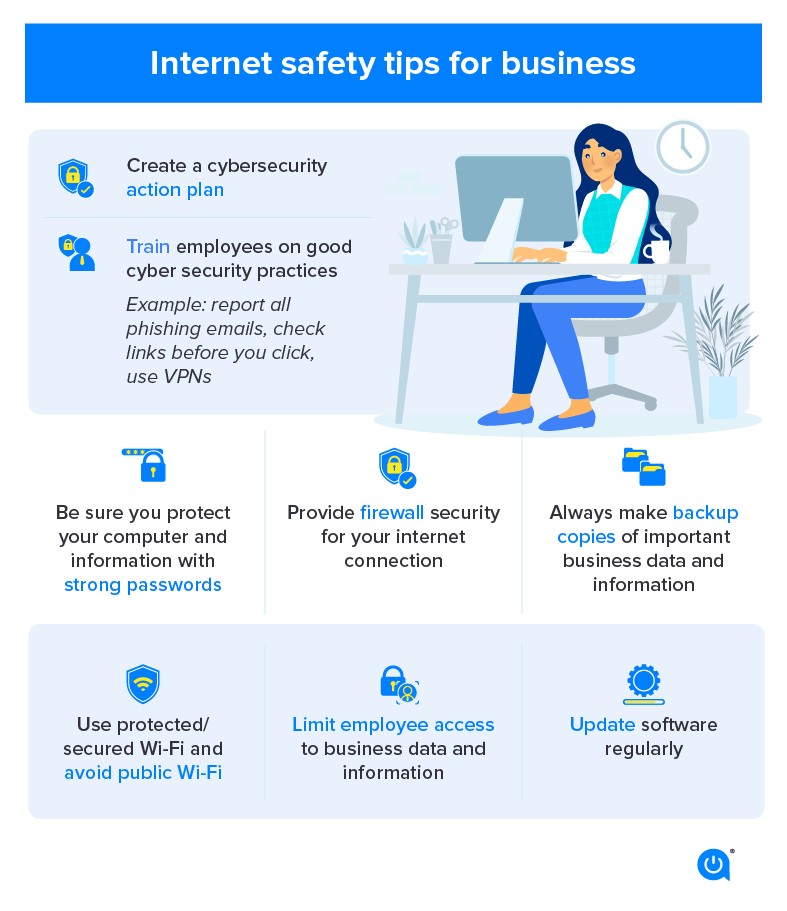Cybersecurity is important for everyone, and businesses are no exception. 61% of small and mid-size businesses (SMBs) were victims of cyberattacks last year and 87% of IT ‘decision makers’ claim they experienced two or more successful attacks in the past year.
Cyberattacks leave not only businesses vulnerable but their employees and consumers as well. Luckily, there are ways to keep your business safe from cybersecurity threats.
Importance of internet safety for businesses
Cyberattacks on businesses can have dire consequences, from breached employee data to losing millions of dollars and compromising consumer security. Unfortunately, many businesses do not take the necessary steps to prevent cyberattacks or minimize the damages if they occur.
According to some recent 2023 statistics about small businesses, only 17% encrypt their data and 64% of small businesses are unfamiliar with cyber insurance. Many small business owners believe their business is too small to be at risk for cyberattacks, often not taking measures to prevent one.
Considering 87% of small businesses have consumer data that could be compromised in an attack, it is imperative to protect business networks, no matter how small.
Cybersecurity is important on a larger scale, too. According to IBM’s 2023 Cost of Data Breach Report, the global average cost of a data breach in 2023 was a whopping $4.45 million, 15% more than in 2020. IBM also reported that 51% of organizations plan to increase security investments, including incident response planning, employee training, threat detection and response tools. Organizations that use security AI and automation also save an average of $1.76 million in data breach costs compared to those that do not.
So, despite the grim reality of the cost of data breaches, there are ways to prevent them, and businesses seem to be heading in the right direction.
Common business internet security threats
Data breaches
Data breaches are among the most severe threats to business networks and can result in significant financial loss while also impacting consumers whose data could’ve been involved in the breach. Data breaches can be caused by many different things, like malware, phishing or hacking.
Malware
Malware is software designed to damage a network, computer or server. Malware can take many forms, like viruses, worms, trojans, ransomware and spyware.
Phishing
Phishing attacks are one of the more common forms of cyberattacks and occur when the hacker is pretending to be a trusted contact to entice a user to open an email, text, file, etc. Once the user clicks on that link or downloads that file, the hacker can exploit them and their network.
Weak passwords
Employees may use weak passwords to make them easier to remember, but they can leave your business vulnerable to cyberattacks. Educating employees about strong passwords and encouraging this practice while also using two-factor authentication can improve security.
Man-in-the-middle attack
Man-in-the-middle attacks occur when hackers insert themselves between two communicating parties. Without knowing, the parties pass information to the other through the hacker.
SQL injection
This attack occurs when a hacker injects malicious SQL code into a backend database. This allows the hacker to access information not meant to be displayed, like sensitive data or consumer details.
Denial-of-service attack
A denial-of-service attack is designed to overrun a targeted network with traffic to exhaust its bandwidth, preventing legitimate users from accessing the expected resources or services.

What are some tips for business internet safety?
Create a cybersecurity action plan
Have a cybersecurity action plan in place. From preventative measures to next steps in times of crisis, it’s important to know what to do next.
Train employees on good cybersecurity practices
Inform employees of basic cybersecurity principles and establish training programs to educate employees on phishing, malware, scams and other harmful security threats. Every management system, like WordPress, has ways to secure your websites from attack as well.
Be sure to protect your computer and information with strong passwords
Employees should use unique passwords and change them after a few months to ensure their accounts remain secure. Multi-factor authentication also adds another layer of password and account protection.
Firewall security
Firewall security protects private networks from outside traffic and can help prevent unauthorized access to data. Make sure firewall security is in place on all devices within an organization.
Always make backup copies of important business data and documents
Regularly backing up data can help in times of security crisis. If a data breach occurs, a backup can at least remedy the impact if data is lost during the cyberattack.
Use protected and secure Wi-Fi
The Wi-Fi network for your business must be secure and encrypted. VPNs are a great tool to keep your network safe. Also, educate employees on the dangers of public Wi-Fi, especially while accessing company data on a public network without proper security precautions.
Limit employee access to business data and information
Employees should only be given access to the data and systems they need for their jobs. Do not give one employee access to all company data.
Update software regularly
Update security software regularly to keep your employees and your business safe.
Learn more about internet safety in our internet safety guide
Find a business internet provider
Some top internet service providers (ISPs) offer business internet options with fast upload and download speeds and security options. Business internet plans are mainly fiber-optic and provide faster speeds than a home internet connection, particularly upload speeds. The business ISPs below each offer business internet plans that are ideal for small businesses. Some also come with added security that you won’t get with a home internet connection.
| Provider | Starting price | Download speed range | Upload speed range |
|---|---|---|---|
| AT&T Fiber | $70.00/mo.* | 300 – 5,000 Mbps | 300 – 2,000 Mbps |
| CenturyLink | $55.00/mo.** | 100 – 940 Mbps | 30 – 940 Mbps |
| Frontier Business Fiber | $69.99/mo.*** | 500 – 2,000 Mbps | 500 – 2000 Mbps |
| Verizon Fios | $59.00/mo.**** | 200 – 2,000 Mbps | 200 – 2,000 Mbps |
| Xfinity | $49.99/mo.***** | 150 Mbps – 1.25 Gbps | 25 – 35 Mbps |
*Pricing per month plus taxes for length of contract. Additional fees and terms may apply. Pricing varies by location and availability. All prices subject to change at any time. May or may not be available based on service address. Speeds may vary.
**Wireless speeds may vary. ***Prices without Autopay and Paperless Billing. Exclusive offer for qualified addresses. For new residential Internet customers only. Max speed capable range for 500 Mbps (450-500 Mbps download/upload), Gig Service (846-940 Mbps download, 792-880 Mbps upload), 2 Gig (1800-2000 Mbps download/upload) and requires 2 Gbps capable devices and wiring. Performance details: frontier.com/internetdisclosures. Requires Auto Pay or $5/mo. fee applies. Beginning April 2022, a printed bill fee of $2.99/mo. will apply, NY, PA and select customers excluded. A $10 fee applies when Internet is disconnected. Equipment return required at disconnection, up to $150 per device if not returned. Multi-Device Security covers up to 10 devices. Other applicable charges and additional services are extra. Subject to availability. Cannot be combined with other offers. Other restrictions, Frontier policies and service terms apply. Last updated 12/04/23.
More business cybersecurity resources
- Federal Communications Commission Cybersecurity Tips
- U.S. Small Business Administration
- Cybersecurity & Infrastructure Security Agency
FAQs
Cybersecurity matters because it protects individuals and organizations from cybercrime, whether it’s data breaches in a company or stealing financial and other sensitive information from an individual.
Hackers can use malicious code to launch a variety of cyberattacks on business networks.

Written by:
Camryn Smith
Cammy is a writer with Allconnect, growing her broadband industry knowledge for over a year on the internet marketplace. Her expertise lies in home internet and broadband service with a focus on providers, plans…
Read more
Edited by:
Robin LaytonEditor, Broadband Content
-
Featured
![Different types of internet security threats to think about in 2024]() Different types of internet security threats to think about in 2024 Robin Layton — 6 min read
Different types of internet security threats to think about in 2024 Robin Layton — 6 min read -
Featured
![10 tips to shop more safely online and protect your privacy]() 10 tips to shop more safely online and protect your privacy Joe Supan — 6 min read
10 tips to shop more safely online and protect your privacy Joe Supan — 6 min read -
Featured
![Internet safety: Guide to keep your information safe online]() Internet safety: Guide to keep your information safe online Michelle Honeyager — 8 min read
Internet safety: Guide to keep your information safe online Michelle Honeyager — 8 min read
Latest
-
Thursday, July 25, 2024
Worried about losing your signal? This is how to keep your satellite dish cleanDavid Anders — 6 min read
-
Tuesday, July 23, 2024
The best free TV and movie streaming services 2024Camryn Smith — 5 min read
-
Tuesday, July 23, 2024
Everything you need to know about internet speedsRobin Layton — 8 min read






